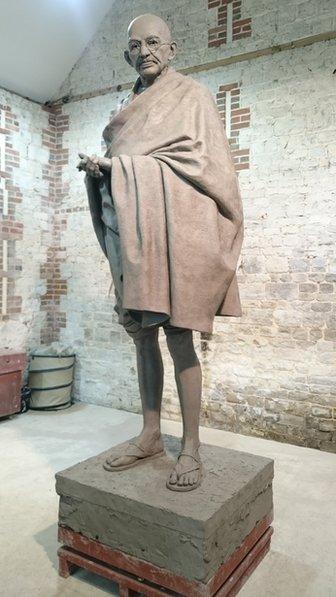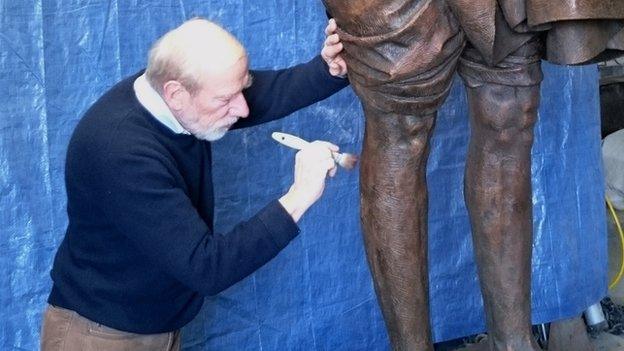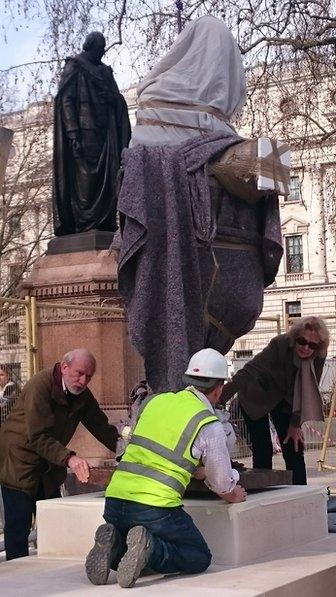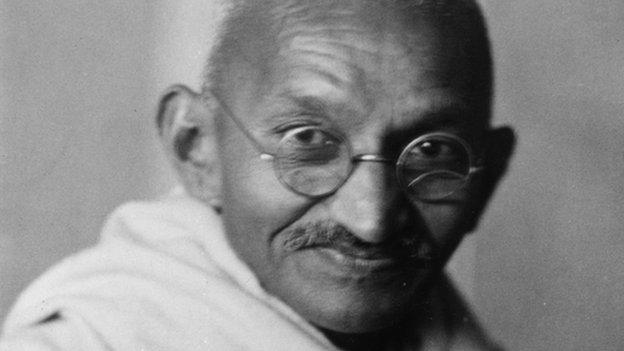Is Gandhi still a hero to Indians?
- Published

A clay model of the statue
When Mahatma Gandhi came to London in 1931, he stayed in the poverty-stricken East End of the city, then visited struggling cotton mill workers in Lancashire.
Now he is to be honoured with a statue in London's Parliament Square, looking out over the Palace of Westminster in the company of such establishment figures as Benjamin Disraeli and his old opponent Sir Winston Churchill.
When the statue was announced, external, the British Prime Minister, David Cameron, said Gandhi's "approach of non-violence will resonate forever as a positive legacy, not just for the UK and India, but the world over".
The statue is designed to pay tribute to a man who lived humbly, loved humanity and practised non-violent struggle against a powerful adversary: the British Empire.
Many of those who gave money for it see him as an example to future generations.
But there is some irony in the fact that even as Gandhi is being so warmly embraced by the British establishment that once mocked him, his legacy in India is more ambivalent.
Hindu hardliners in India, emboldened perhaps by the sweeping national election victory last year of the pro-Hindu nationalist party, the BJP, are increasingly vocal in criticising, external Gandhi.
They accuse him of having betrayed Hindus by being too pro-Muslim, and even for the division of India and the bloodshed that marked partition.
That, of course, was the belief of Nathuram Godse, the man who assassinated Gandhi in January 1948. Godse's reputation too is being revised.
This year, the anniversary of Gandhi's murder was marked by attempts by right-wing Hindus to build a temple to honour Godse, a man they now describe as a hero for ridding the nation of Gandhi.

Gandhi statue

Sculptor Philip Jackson working on the statue
The project cost more than £1m
The money was raised in less than six months through donations from people in the UK and India
The statue is inspired by photographs of Gandhi in London in 1931
It is 9ft tall (2.7m) and uses three-quarters of a tonne of bronze
Gandhi will be the first Indian represented in Parliament Square - and the only person who never held political office

Gandhi has always been a controversial figure. In his day, he was a thorn in the side of his British rulers before Indian Independence - with his campaigns of civil disobedience, his fasts and his dangerously powerful charisma.
In the 1930s, Churchill described, external Gandhi as "a seditious Middle Temple lawyer, posing as a fakir of a type well known in the East".

The statue will stand in Parliament Square
But in present-day Britain, Gandhi is largely revered by a generation that is embarrassed about its colonial history and eulogises non-violent methods of effecting change.
In India, there are certainly contemporary politicians who take inspiration from Gandhi.
Arvind Kejriwal, for example, the anti-corruption campaigner and new chief minister of Delhi, whose party recently won a landslide victory in the capital.
It is true, too, that decades of Indian schoolchildren have learned to call Gandhi "the Father of the Nation".
His face is everywhere, from bank notes to framed portraits in public buildings.
But attitudes are subtly changing in mainstream India, as well as among the hardliners.
The values Gandhi embodied - a vision of self-sufficient, village India and a lack of commercialism - seem old-fashioned to many in today's urban, industrialised, hi-tech India.
Now, a fast-paced, young generation craves luxury goods and international travel, not the chance to retreat to a village and spin khadi.
That leads to another truth: a reversal in economic fortunes as well as attitudes.
In the first half of the last century, many in Britain considered themselves economically superior to India.
Now, by contrast, British politicians are rushing to court it, eager to attract its students to study and its business moguls to invest.

Who was Gandhi?

born on 2 October 1869 in Porbandar, Gujarat, India
leader of the Indian nationalist movement against British rule
his use of non-violent protest to achieve political and social progress has been hugely influential
known for his devout Hindu faith and ascetic lifestyle, often dressing only in a loincloth and shawl
imprisoned several times during his pursuit of non-violent protest
undertook a number of hunger strikes to protest against the oppression of India's poorest classes, among other injustices
often called "Mahatma", which means "great-souled", or, in India, "Bapu", which means "father"
assassinated on 30 January 1948 in Delhi, by Nathuram Godse

No wonder then that the establishment wants to salute Gandhi and show him respect.
Ultimately the grand unveiling of this costly statue begs another question: what would Mahatma Gandhi himself make of it?
Of course it is impossible to know but one of his surviving grandsons, Arun Gandhi, who was a schoolboy of 14 when his grandfather died, doubts he would be pleased.
Speaking to me from his home in the US, he described it as the wrong tribute.
"My grandfather didn't want people to erect statues," he said.
"He wanted people to follow his message."